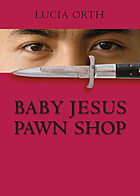 I am very pleased to post this essay by my friend Lucia Orth, author of the 2008 critically-acclaimed Baby Jesus Pawn Shop:
I am very pleased to post this essay by my friend Lucia Orth, author of the 2008 critically-acclaimed Baby Jesus Pawn Shop:
I came across some old notes in the past few weeks from an interview and the follow-up research I did while working on the early stages of my first novel, Baby Jesus Pawn Shop, set in the Philippines during the Marcos regime.
I had the title of the novel and the main character, Doming, but I didn’t yet have a feel for the other main character, Rue Caldwell. Her name, to her, does not mean “to rue” as in to feel sorrow, but rather—as noted in the novel—the plant “rue,” also known as the “herb of grace.” (Thank you, Oxford English Dictionary, always a source of evocative connections.)
In thinking about my years in Manila, I remembered an entomologist I’d met there. Insects! But, of course. As a child I loved insects and had no fear of them. In Manila I’d shown my own toddlers the rhinoceros beetle and the giant atlas moth, both found on our lanai.
Rue’s occupation would be biologist/botanist, now specializing in rice pests (rice being the basic food of the Philippines). Through common friends, I tracked the entomologist I’d met in Manila down to Washington, D.C., and out of the blue I called him. Why? I just wanted to talk to someone who’d lived in the Philippines, traveled the country—someone who knew its biology and botany.
“Yes, there’s a lot a biologist might do there. The most important issue right now is a moth, the yellow stem borer, completely undistinguished, that’s the leading cause of blight. It drills into the hollow stem at the egg-laying stage. There’s no damage shown on the outside, but also no yield, as it severs the growing part.”
“Hmm,” I think, “stem borer, interesting word…cuts off the growth.”
“So instead of green on the inside, when we cut the stems open we see brown.”
Beat. Wow, I’m thinking.
“This damage is called deadheart,” he says.
He didn’t understand my audible gasp of realization. I had just glimpsed not only Rue’s occupation, but also a sense of who she was, where she came from, and the rest of what the novel might be. I began to understand how she would perceive things, how she would rely on logic, what she would notice, and how, although she could look through her microscope and see the “enemy,” she could not examine her own heart, nor would she look closely at the heart of the country—the Philippines.
Her work would become both her anchor and her way of seeing the world.
There have been other times in writing when I’ve found a word—especially from science or nature—that provided a new insight: the transgressive sea (a term from geology) and scotobiology, the biology of darkness. I’ve used both these words in essays. But the word deadheart, and all that it came to mean, stands out as the discovery (other than the title) that gave me the novel Baby Jesus Pawn Shop.
No reading is useless to the writer—it’s all discovery: science magazines, the dictionary, the newspaper. As Robert Olen Butler said in a workshop I took with him years ago, quoting Henry James, “A writer is one on whom nothing is wasted.”
From the New World Encyclopedia:
Entomology is the scientific study of insects. Insects are arthropods (phylum Arthropoda) belonging to the Class Insecta. With around 925,000 described species, insects comprise the most numerous and diverse group of animals, representing more than half (about 57 percent) of all identified animal species, and date back about 400 million years. It is a specialty within the field of biology.
 Lucia Orth worked for a non-profit organization in Manila for five years and now teaches law in the Indigenous and American Indian Studies Department at Haskell Indian Nations University in Lawrence, Kansas. She spent spring semester of 2009 working in Trento, Italy and presented a writing workshop on “Placing Your Story” at the Writers Garret in Dallas, Texas, on June 20, 2009.
Lucia Orth worked for a non-profit organization in Manila for five years and now teaches law in the Indigenous and American Indian Studies Department at Haskell Indian Nations University in Lawrence, Kansas. She spent spring semester of 2009 working in Trento, Italy and presented a writing workshop on “Placing Your Story” at the Writers Garret in Dallas, Texas, on June 20, 2009.
Departure,” an excerpt from her novel-in-progress, was published in the Asia Literary Review, (Winter 2008, Hong Kong). She is also a contributor to the anthology Because I Love Her: 34 Women Writers Reflect on the Mother-Daughter Bond, Andrea N. Richesin, editor (April 2009). Lucia can be reached through her website.

Thanks for the link. Lucia is great, and I loved her book (but I think you know that). She has a standing invitation to visit my monthly writers group once she gets back to KS.
Jason.
Thanks, Jason! Lucia’s amazing, isn’t she?
Victoria
Great post! Thanks. I’ll be sending my coaching clients and students to read this one.